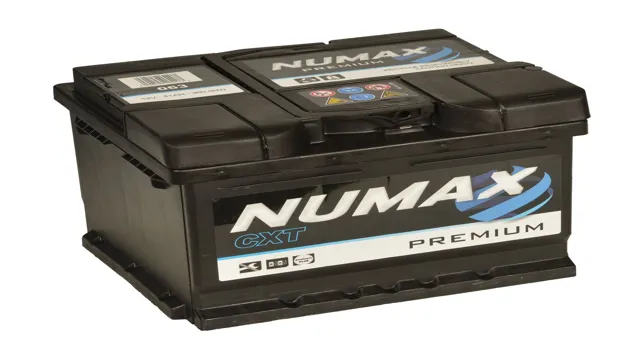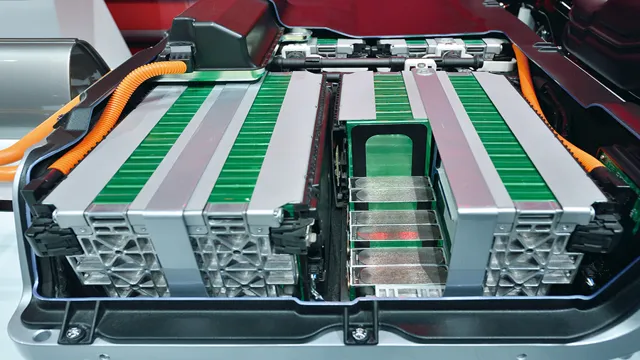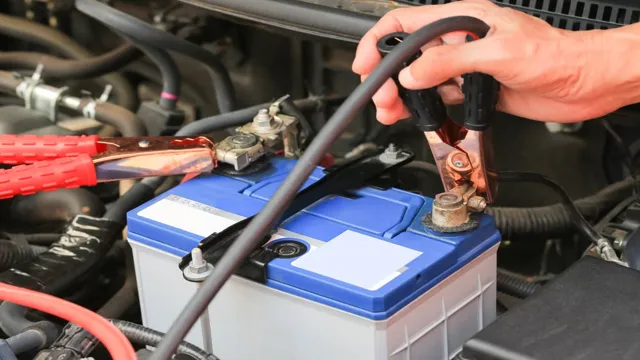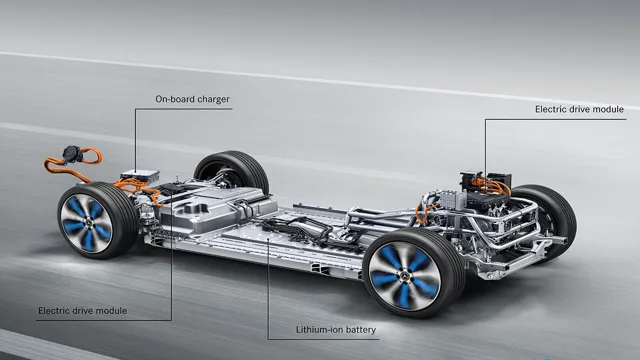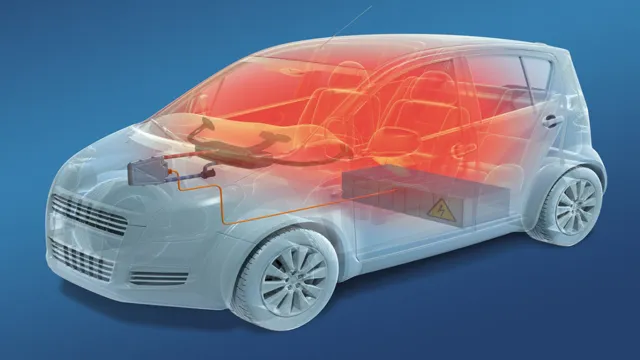Rev Up Your Electric Car: The Ultimate Guide to Understanding 12V Batteries
Are electric cars the future of transportation? It certainly seems so, as more and more car manufacturers are jumping on the electric bandwagon every year. But did you know that one of the most essential components of an electric car is the 12v battery? While electric cars are powered by a large battery pack, they still require a regular 12v battery like a traditional gas-powered car. This battery is responsible for powering all of the car’s electronic systems, such as the radio, headlights, and dashboard displays.
But the 12v battery in an electric car is much more critical than just powering these peripheral systems. In fact, without a properly functioning 12v battery, an electric car may not even be able to start. This is because the 12v battery is important for initializing the car’s main battery pack and other electrical systems.
Without a reliable 12v battery, an electric car may suffer from a host of problems, including decreased range, slower acceleration, and even a complete shutdown of the vehicle. That’s why it’s essential to ensure that the 12v battery is in good working condition and to replace it when necessary. Think of the 12v battery in an electric car like the heart of the vehicle.
It may be small, but it’s responsible for keeping the car running smoothly. So the next time you hop in your electric car, take a moment to appreciate the importance of that little 12v battery.
Powering the Vehicle’s Electronics
When it comes to electric cars, people often wonder how the vehicle’s electronics are powered since there is no traditional engine under the hood. This is where the 12v battery in an electric car comes into play. While the primary source of power in an electric car is the high-voltage battery used for propulsion, the 12v battery serves as a backup source of power.
It is responsible for powering the car’s lights, radio, and other electronics while the car is turned off or charging. Similar to a conventional car, the 12v battery in an electric car needs regular maintenance to ensure it is functioning correctly. However, it is essential to note that the 12v battery is not responsible for powering the electric motor that propels the car.
That is the job of the high-voltage battery pack. So, while the 12v battery may seem small in comparison, it plays a vital role in powering the many electronics in an electric car and keeping them running smoothly.
The Role of the 12v Battery in Electric Cars
The 12v battery in an electric car is an essential component of the vehicle, as it not only starts the engine but also powers the electronics. These electronics include the headlights, brake lights, air conditioning, and dashboard display. Essentially, the 12v battery is responsible for the vehicle’s accessories, while the primary high voltage battery (usually a lithium-ion battery) is responsible for propelling the car.
The 12v battery is not as powerful as the primary battery but is necessary for the car’s basic functions. One analogy to think about is that the primary battery can be compared to the heart of the car, while the 12v battery is more like the veins and arteries, keeping all of the electronics functioning properly. In summary, the 12v battery may not be the star of an electric car, but it certainly is a vital supporting actor.

How it is Different from Traditional Cars’ Batteries
One of the main differences between electric cars’ batteries and traditional car batteries is how they power the vehicle’s electronics. With traditional cars, the battery’s primary function is to start the engine. Once the engine is running, the alternator takes over and provides power to the car’s electrical systems.
However, electric cars rely entirely on the battery to power everything, including the electronics that control the vehicle’s motors, charging systems, and climate control. This means that electric car batteries need to be much more sophisticated and advanced than traditional car batteries, as they have to handle a lot more power and provide a steady stream of energy to keep the car running smoothly. Additionally, electric car batteries also need to be able to handle frequent charging and discharging cycles, as well as extreme temperatures, in order to maintain optimal performance and longevity.
As a result, electric car batteries are typically much larger and more expensive than traditional car batteries, but they are also more reliable and efficient in powering an electric vehicle.
Choosing the Right 12v Battery for Your Electric Car
One of the most crucial components in an electric car is the 12v battery. This battery is responsible for powering the car’s lighting, entertainment system, and other electronics. Choosing the right 12v battery for your electric car is essential to ensure that these systems run smoothly and efficiently.
When selecting a battery, it is important to consider factors such as voltage, capacity, and durability. A high-quality battery that can withstand the harsh conditions of an electric car can save you money in the long run by reducing the need for replacements and repairs. Additionally, choosing a battery with a long lifespan will provide you with a reliable power source for years to come.
Don’t underestimate the importance of a good 12v battery in your electric car – it can make all the difference in the performance and longevity of your vehicle.
Factors to Consider when Selecting a 12v Battery
When it comes to selecting the right 12v battery for your electric car, there are several factors to consider. First and foremost, you’ll want to make sure you choose a battery that’s compatible with your car’s make and model. Additionally, you’ll want to consider the battery’s capacity, as this will impact how long you can drive your car before needing to recharge.
Other factors to take into account include the battery’s size, weight, and cost. Ultimately, the right battery for you will depend on your specific needs and budget. By taking the time to research and compare different options, you can find a battery that meets your requirements and keeps your car running smoothly.
So, whether you’re a seasoned electric car driver or just getting started, choosing the right 12v battery is an essential part of maintaining your vehicle’s performance.
Types of 12v Batteries for Electric Cars
When it comes to choosing the right 12v battery for your electric car, there are a few different types to consider. One popular option is a lead-acid battery, which is affordable and widely available. These batteries are known for their durability and resilience to fluctuations in temperature.
However, they can be heavy and may require regular maintenance. Another option is a lithium-ion battery, which is lighter and more energy-efficient than lead-acid batteries. These batteries are also more expensive and may not last as long in extreme temperatures.
Ultimately, the type of 12v battery you choose will depend on your individual needs and preferences. Consider factors such as cost, weight, and maintenance requirements before making your decision.
Comparing Battery Lifespan and Maintenance Needs
When it comes to choosing the right 12v battery for your electric car, it’s important to consider both battery lifespan and maintenance needs. One popular option is the lithium-ion battery, known for its long lifespan and minimal maintenance requirements. However, these batteries can be more expensive than other options, such as lead-acid batteries.
It’s important to weigh the initial cost against the long-term savings that come with a longer lifespan and less frequent maintenance. Additionally, considering the overall weight and size of the battery is important for electric car efficiency and performance. Remember, choosing the right battery can have a big impact on your electric car’s overall performance and cost efficiency, so it’s worth taking the time to research and compare your options.
Caring for Your Car’s 12v Battery
As more drivers switch to electric cars, it’s important to know how to care for the 12v battery. This smaller battery may seem insignificant compared to the larger one powering the car, but it plays a critical role in powering the vehicle’s electrical systems and accessories. To keep it running smoothly, regular maintenance is key.
That means checking the battery’s voltage periodically, cleaning the terminals to prevent corrosion, and replacing the battery every few years as needed. It’s also important to avoid leaving the car’s electrical accessories running for prolonged periods when the car is turned off, as this can drain the battery. With proper care, your electric car’s 12v battery will last longer and help keep your car running smoothly.
Tips on Maintaining Your 12v Battery’s Performance
If you want to ensure that your car’s 12v battery is performing at its best, there are a few simple tips you can follow. Firstly, it’s important to regularly inspect and clean the battery terminals to prevent corrosion and ensure a strong connection. You should also make sure that the battery is securely fastened in place, as loose connections can cause damage to the battery and other parts of your car.
In addition to this, keeping your battery charged is essential for maintaining its performance. You can do this by regularly using your car and taking longer drives to allow the battery to charge fully. If you’re not using your car for an extended period, it’s recommended to disconnect the battery to prevent it from draining.
By taking these simple steps to care for your car’s 12v battery, you can help to ensure that it provides reliable performance for years to come.
Common Issues and Troubleshooting Tips
If you’re a car owner, you understand the importance of caring for your 12v battery. There are a few common issues that can arise with these batteries, including corrosion on the terminals, low fluid levels, and shorts in the wiring. To prevent corrosion, make sure to clean the terminals regularly with a mixture of baking soda and water.
It’s also essential to check the fluid levels frequently and top off as needed with distilled water. If you notice any signs of wear or damage in the wiring, it’s crucial to have it inspected and repaired promptly. By taking these simple steps, you can extend the life of your 12v battery and avoid unexpected breakdowns.
Conclusion: Why a Reliable 12v Battery is Essential for Your Electric Car
To sum it all up, the 12v battery in an electric car is like the brain of a human. Just like how our brain controls our body, the 12v battery controls the various systems and components in the car. It may seem small compared to the massive battery pack that powers the electric motor, but its importance cannot be overstated.
Without it, the car wouldn’t be able to function properly. So, if you want your electric car to be as sharp as a whip, make sure to give its brain – the humble 12v battery – the attention it deserves!
FAQs
Why do electric cars use a 12v battery?
Electric cars use a 12v battery to power their accessories, such as lights and infotainment systems.
Can the 12v battery in an electric car be replaced easily?
Yes, the 12v battery in an electric car can be replaced easily like in a traditional gas-powered car.
How long does a 12v battery last in an electric car?
The lifespan of a 12v battery in an electric car can vary depending on usage and the environment, but it typically lasts 3-5 years.
Can I use a regular car battery instead of a 12v battery in an electric car?
No, a regular car battery cannot be used instead of a 12v battery in an electric car as it may not have the necessary specifications for the unique electrical system in electric cars.
